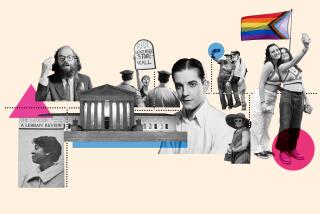Legalizing gay marriage is good for public health, studies show
- Share via
President Obama said Wednesday that he now supports gay marriage. In an interview with Robin Roberts of ABC News, he explained that for him, it’s an issue of fairness: “It’s also the Golden Rule, you know, treat others the way you would want to be treated.”
But studies show there’s another reason to favor gay marriage – it’s good for public health.
A study published in February by the American Journal of Public Health found that gay men in Massachusetts were in better physical and mental health after that state became the first to recognize same-sex marriage in 2003. Researchers examined the medical records of 1,211 gay and bisexual men who went to “a large, community-based health clinic” in a “large metropolitan city” and compared the patients’ use of medical services before and after the law went into effect.
Men in the study went to the clinic for a medical problem an average of 2.61 times in the 12 months before same-sex marriage was legalized; in the 12 months after the law passed, that average dropped to 2.26 times. The money spent on medical care also dropped, from $259.32 per patient, on average, to $233.09, the researchers found.
Mental health improved as well, according to the study. The number of visits to the clinic related to a mental health issue dropped from 3.35 per patient, on average, to 2.93, while mental healthcare costs fell from $331.08 to $283.59.
Overall, the number of visits to the clinic fell by 13% after gay marriage was legalized – and both partnered and single gay men benefited, the researchers found. “One mechanism that may explain these findings is a reduction in the amount and frequency of status-based stressors that sexual minority men experience when institutionalized forms of stigma are eliminated,” they wrote.
Another report, published in March in the American Journal of Public Health, used data on 202 gay men participating in an ongoing study at UCLA. The study’s main purpose is to track the mental health of older gay men (ranging in age from 44 to 75) as they deal with the stigma of being in a sexual minority as well as the emotional toll of dealing with HIV and AIDS. The researchers, from UCLA and San Francisco State University, also took advantage of the fact that gay marriage was legal in California between June and November of 2008.
The California researchers found that men who were legally married to men were more likely than other gay men to have a “positive affect.” That means they were more apt to be “relaxed,” “calm” and “peaceful” and to feel hopeful for the future, among other psychological measures. Gay men in domestic partnerships did not get the same boost, the researchers found.
Likewise, gay men with legal husbands were also less likely to be depressed, according to the study. The same was not true for gay men in domestic partnerships.
The benefits of gay marriage aren’t limited to the health arena. University of Massachusetts labor economist Lee Badgett has found that legally married same-sex couples are less of a drag on taxpayers. That’s partly because married couples are eligible for fewer welfare benefits than single people are, but also because people who are married can lean on their spouses for financial support, according to this news analysis in Science (subscription required). Legalizing gay marriage, Badgett is quoted as saying, “can save taxpayers money.”
The same story also quoted Letitia Anne Peplau, a social psychologist at UCLA who testified in the federal court challenge to Proposition 8, the 2008 ballot initiative that banned gay marriage in California.
“Marriage appears to confer a number of benefits, psychological and otherwise,” she told Science. “There isn’t anything in the scientific literature that suggests that gay or lesbian people would benefit less or differently than heterosexual people from access to the institution of marriage.”
Return to the Booster Shots blog.
RELATED:
Medical treatment carries possible side effect of limiting homosexuality
Cynthia Nixon says she’s gay by ‘choice.’ Is it really a choice?







